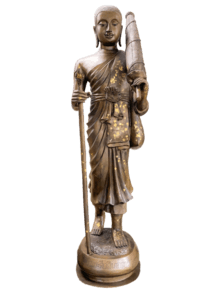Sīvali
Sīvali (Pali: Sīvali; Burmese: ရှင်သီဝလိ pronounced [ʃɪ̀ɴ θìwəlḭ]; Thai: พระสีวลี RTGS: phra siwali; Chinese: 尸婆羅) is an arhat widely venerated among Theravada Buddhists. He is the patron saint of travel and is believed to ward off misfortunes at home such as fire or theft.[1] His veneration predates the introduction of Theravada Buddhism into Burma.

Sīvali is typically depicted standing upright and carrying a walking staff, an alms bowl and Buddhist prayer beads.[2] Born to Queen Suppavasa, Sīvali is believed to have remained in his mother's womb for seven years because of past karma.[2] After a week in labor, Sīvali's mother gave birth to a precocious boy who could immediately speak. Thereafter, Gautama Buddha's chief disciple, Sariputta, admitted Sīvali into the sangha.[3] The Burmese believe that he is still living, that he can be invoked to come by a special incantation and that his mere invisible presence will bring them prosperity and good fortune.[3]
See also
| Wikimedia Commons has media related to Sivali Thera. |
- Arahant
- Upagupta
- Shin Upagutta
- Ari Buddhism
References
- Cooler, Richard M. "Chapter III The Pagan Period: Burma's Classic Age - 11th To 14th Centuries". The Art and Culture of Burma. Northern Illinois University. Retrieved 18 March 2012.
- Paw, Maung. "Maha Sivali Thera" (PDF). Retrieved 18 March 2012.
- Maung Htin Aung (2 October 2008). "Shin Thiwali". Folk Elements in Burmese Buddhism. Retrieved 18 March 2012.